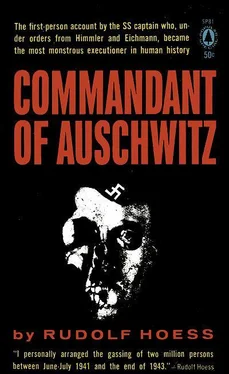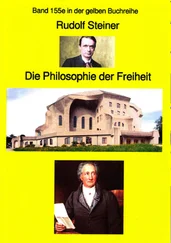In the spring of 1942 the first transports of Jews, all earmarked for extermination, arrived from Upper Silesia. [79]
They were taken from the detraining platform to the “cottage”—to bunker I—across the meadows where later building site II was located. [80]
The transport was conducted by Aumeier and Palitzsch and some of the block leaders. They talked with the Jews about general topics, inquiring concerning their qualifications and trades, with a view to misleading them. On arrival at the “cottage,” they were told to undress. At first they went calmly into the rooms where they were supposed to be disinfected. But some of them showed signs of alarm, and spoke of death by suffocation and of annihilation. A sort of panic set in at once. Immediately all the Jews still outside were pushed into the chambers, and the doors were screwed shut. With subsequent transports the difficult individuals were picked out early and most carefully supervised. At the first signs of unrest, those responsible were unobtrusively led behind the building and killed with a small-caliber gun, that was inaudible to the others. The presence and calm behavior of the Special Detachment served to reassure those who were worried or who suspected what was about to happen. [81]
A further calming effect was obtained by members of the Special Detachment accompanying them into the rooms and remaining with them until the last moment, while an SS man also stood in the doorway until the end.
It was most important that the whole business of arriving and undressing should take place in an atmosphere of the greatest possible calm. People reluctant to take off their clothes had to be helped by those of their companions who had already undressed, or by men of the Special Detachment.
The refractory ones were calmed down and encouraged to undress. The prisoners of the Special Detachment also saw to it that the process of undressing was carried out quickly, so that the victims would have little time to wonder what was happening.
The eager help given by the Special Detachment in encouraging them to undress and in conducting them into the gas chambers was most remarkable. I have never known, nor heard, of any of its members giving these people who were about to be gassed the slightest hint of what lay ahead of them. On the contrary, they did everything in their power to deceive them and particularly to pacify the suspicious ones. Though they might refuse to believe the SS men, they had complete faith in these members of their own race, and to reassure them and keep them calm the Special Detachments therefore always consisted of Jews who themselves came from the same districts as did the people on whom a particular action was to be carried out.
They would talk about life in the camp, and most of them asked for news of friends or relations who had arrived in earlier transports. It was interesting to hear the lies that the Special Detachment told them with such conviction, and to see the emphatic gestures with which they underlined them.
Many of the women hid their babies among the piles of clothing. The men of the Special Detachment were particularly on the lookout for this, and would speak words of encouragement to the woman until they had persuaded her to take the child with her. The women believed that the disinfectant might be bad for their smaller children, hence their efforts to conceal them.
The smaller children usually cried because of the strangeness of being undressed in this fashion, but when their mothers or members of the Special Detachment comforted them, they became calm and entered the gas chambers, playing or joking with one another and carrying their toys.
I noticed that women who either guessed or knew what awaited them nevertheless found the courage to joke with the children to encourage them, despite the mortal terror visible in their own eyes.
One woman approached me as she walked past and, pointing to her four children who were manfully helping the smallest ones over the rough ground, whispered:
“How can you bring yourself to kill such beautiful, darling children? Have you no heart at all?”
One old man, as he passed by me, hissed:
“Germany will pay a heavy penance for this mass murder of the Jews.”
His eyes glowed with hatred as he said this. Nevertheless he walked calmly into the gas chamber, without worrying about the others.
One young woman caught my attention particularly as she ran busily hither and thither, helping the smallest children and the old women to undress. During the selection she had had two small children with her, and her agitated behavior and appearance had brought her to my notice at once. She did not look in the least like a Jewess. Now her children were no longer with her. She waited until the end, helping the women who were not undressed and who had several children with them, encouraging them and calming the children. She went with the very last ones into the gas chamber. Standing in the doorway, she said:
“I knew all the time that we were being brought to Auschwitz to be gassed. When the selection took place I avoided being put with the able-bodied ones, as I wished to look after the children. I wanted to go through it all, fully conscious of what was happening. I hope that it will be quick. Goodbye!”
From time to time women would suddenly give the most terrible shrieks while undressing, or tear their hair, or scream like maniacs. These were immediately led away behind the building and shot in the back of the neck with a small-caliber weapon.
It sometimes happened that, as the men of the Special Detachment left the gas chamber, the women would suddenly realize what was happening, and would call down every imaginable curse upon our heads.
I remember, too, a woman who tried to throw her children out of the gas chamber, just as the door was closing. Weeping, she called out:
“At least let my precious children live.”
There were many such shattering scenes, which affected all who witnessed them.
During the spring of 1942 hundreds of vigorous men and women walked all unsuspecting to their death in the gas chambers, under the blossom-laden fruit trees of the “cottage” orchard. This picture of death in the midst of life remains with me to this day.
The process of selection, which took place on the unloading platforms, was in itself rich in incident.
The breaking up of families, and the separation of the men from the women and children, caused much agitation and spread anxiety throughout the whole transport. This was increased by the further separation from the others of those capable of work. Families wished at all costs to remain together. Those who had been selected ran back to rejoin their relations. Mothers with children tried to join their husbands, or old people attempted to find those of their children who had been selected for work, and who had been led away.
Often the confusion was so great that the selections had to be begun all over again. The limited area of standing room did not permit better sorting arrangements. All attempts to pacify these agitated mobs were useless. It was often necessary to use force to restore order.
As I have already frequently said, the Jews have strongly developed family feelings. They stick together like limpets. Nevertheless, according to my observations, they lack solidarity. One would have thought that in a situation such as this they would inevitably help and protect one another. But no, quite the contrary. I have often known and heard of Jews, particularly those from Western Europe, who revealed the addresses of those members of their race still in hiding.
One woman, already in the gas chamber, shouted out to a noncommissioned officer the address of a Jewish family. A man who, to judge by his clothes and deportment, appeared to be of very good standing gave me, while actually undressing, a piece of paper on which was a list of the addresses of Dutch families who were hiding Jews.
Читать дальше












